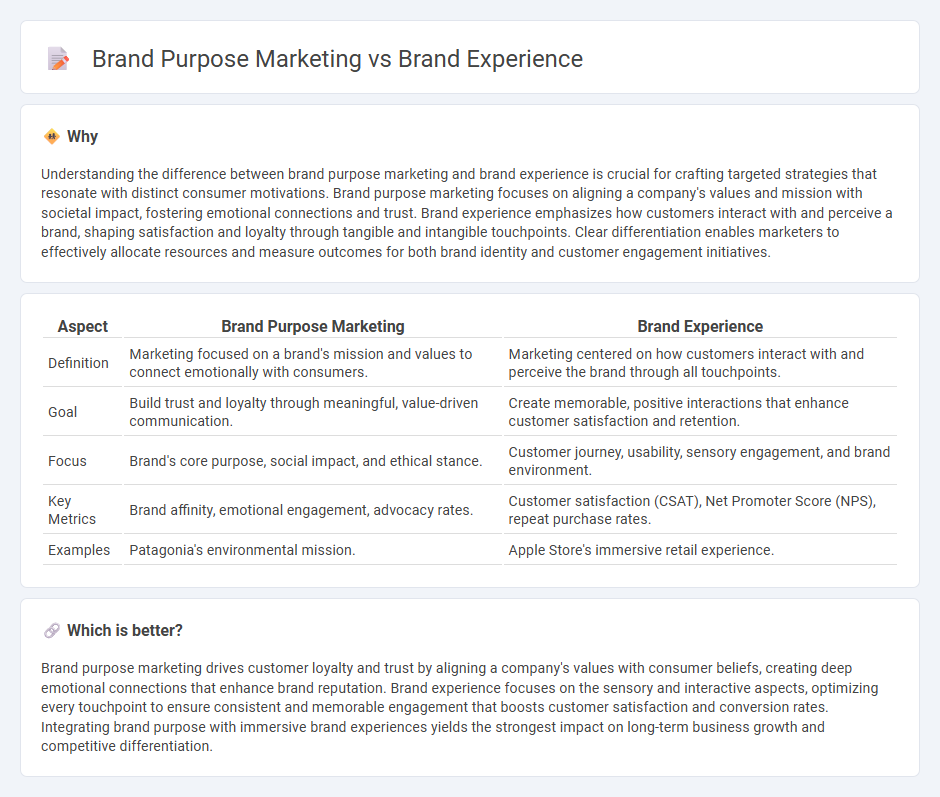
Brand purpose marketing focuses on aligning a brand's mission and values with consumer expectations to create meaningful connections, driving loyalty and trust. Brand experience emphasizes every interaction consumers have with the brand, ensuring consistency and emotional engagement across all touchpoints. Discover how integrating brand purpose and brand experience can elevate your marketing strategy.
Why it is important
Understanding the difference between brand purpose marketing and brand experience is crucial for crafting targeted strategies that resonate with distinct consumer motivations. Brand purpose marketing focuses on aligning a company's values and mission with societal impact, fostering emotional connections and trust. Brand experience emphasizes how customers interact with and perceive a brand, shaping satisfaction and loyalty through tangible and intangible touchpoints. Clear differentiation enables marketers to effectively allocate resources and measure outcomes for both brand identity and customer engagement initiatives.
Comparison Table
| Aspect | Brand Purpose Marketing | Brand Experience |
|---|---|---|
| Definition | Marketing focused on a brand's mission and values to connect emotionally with consumers. | Marketing centered on how customers interact with and perceive the brand through all touchpoints. |
| Goal | Build trust and loyalty through meaningful, value-driven communication. | Create memorable, positive interactions that enhance customer satisfaction and retention. |
| Focus | Brand's core purpose, social impact, and ethical stance. | Customer journey, usability, sensory engagement, and brand environment. |
| Key Metrics | Brand affinity, emotional engagement, advocacy rates. | Customer satisfaction (CSAT), Net Promoter Score (NPS), repeat purchase rates. |
| Examples | Patagonia's environmental mission. | Apple Store's immersive retail experience. |
Which is better?
Brand purpose marketing drives customer loyalty and trust by aligning a company's values with consumer beliefs, creating deep emotional connections that enhance brand reputation. Brand experience focuses on the sensory and interactive aspects, optimizing every touchpoint to ensure consistent and memorable engagement that boosts customer satisfaction and conversion rates. Integrating brand purpose with immersive brand experiences yields the strongest impact on long-term business growth and competitive differentiation.
Connection
Brand purpose marketing strengthens emotional connections by aligning a company's mission with consumer values, creating authentic brand experiences that foster loyalty and trust. Immersive brand experiences deliver tangible interactions reflecting the brand's core purpose, enhancing recall and differentiating it in competitive markets. This synergy between purpose and experience drives consistent messaging that resonates deeply with target audiences.
Key Terms
Customer Engagement
Brand experience centers on creating immersive and memorable interactions that foster emotional connections and drive customer loyalty, while brand purpose marketing highlights the company's core mission and values to inspire trust and align with consumer beliefs. Effective customer engagement is achieved by blending authentic brand purpose with dynamic experiences that resonate deeply with target audiences. Explore how integrating brand purpose and experience can elevate your customer engagement strategies.
Emotional Connection
Brand experience centers on creating immersive interactions that evoke positive emotions and foster loyalty, while brand purpose marketing emphasizes a company's core mission and values to build meaningful relationships based on shared ideals. Emotional connection in brand experience is driven by sensory engagement and memorable moments, whereas brand purpose marketing taps into consumers' beliefs and causes they care about. Discover how harnessing both strategies can deepen emotional bonds with your audience.
Value Proposition
Brand experience centers on creating memorable and engaging interactions that reinforce the customer's perception of a brand, enhancing loyalty and emotional connection. Brand purpose marketing emphasizes a brand's core mission and values, aligning products and campaigns with societal impact and meaningful causes to build trust and relevance. Explore how integrating brand experience with a clear brand purpose can elevate your value proposition and drive deeper customer engagement.
Source and External Links
Everything You Need to Know About Brand Experience - Brand experience is the holistic, lasting impression--including thoughts, feelings, perceptions, and reactions--that customers have before, during, and after interacting with your brand across all touchpoints.
What is Brand Experience and Why is it Important? | Amazon Ads - Brand experience refers to the overall perception customers form through every interaction with your business, from advertising and digital marketing to products and customer service.
Brand Experience: Your Ultimate Guide - Brand experience is how consumers emotionally connect with a brand through real-life interactions, shaping their feelings, beliefs, and behaviors toward the brand.
 dowidth.com
dowidth.com